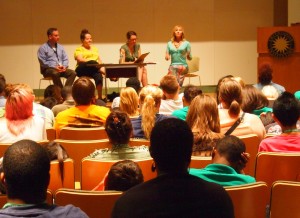The Importance of Lifelong Mentoring
On July 19th, the Smithsonian Institution’s Ripley Center hosted an open panel discussion on the importance of life long mentoring for current members of 4-H, the nation’s largest youth development organization.
The panel consisted of four professionals offering their own experiences with both personal and work-related mentors: Adam Silvey, an Employee Developement Specialist at the Smithsonian’s office of Human Resources and Program Manager for the Smithsonian’s Mentorship Program, Erika Ferrin, a 4-H alumni and Brand Marketing Manager for the Smithsonian, Amrys Williams, a postdoctoral fellow at the National Museum of American History, and Karen Carter, a Program Specialist at the Smithsonian’s Office of Fellowships and Internships. With various individual stories and examples, all four demonstrated how mentorships are lifelong processes that require effort on both the giving and receiving ends. Mentoring forces both parties to take responsibility for themselves, as well as teaching resilience and self-knowledge through working with others in one’s community. The panelists emphasized the benefits of having relationships with other people by describing how their own careers and lives gained success through the influence of close peers. Mentors often evolve from personal relationships and, even if the mentor and mentee only meet occasionally to casually converse or advise, can prove to be integral to a successful lifestyle.







